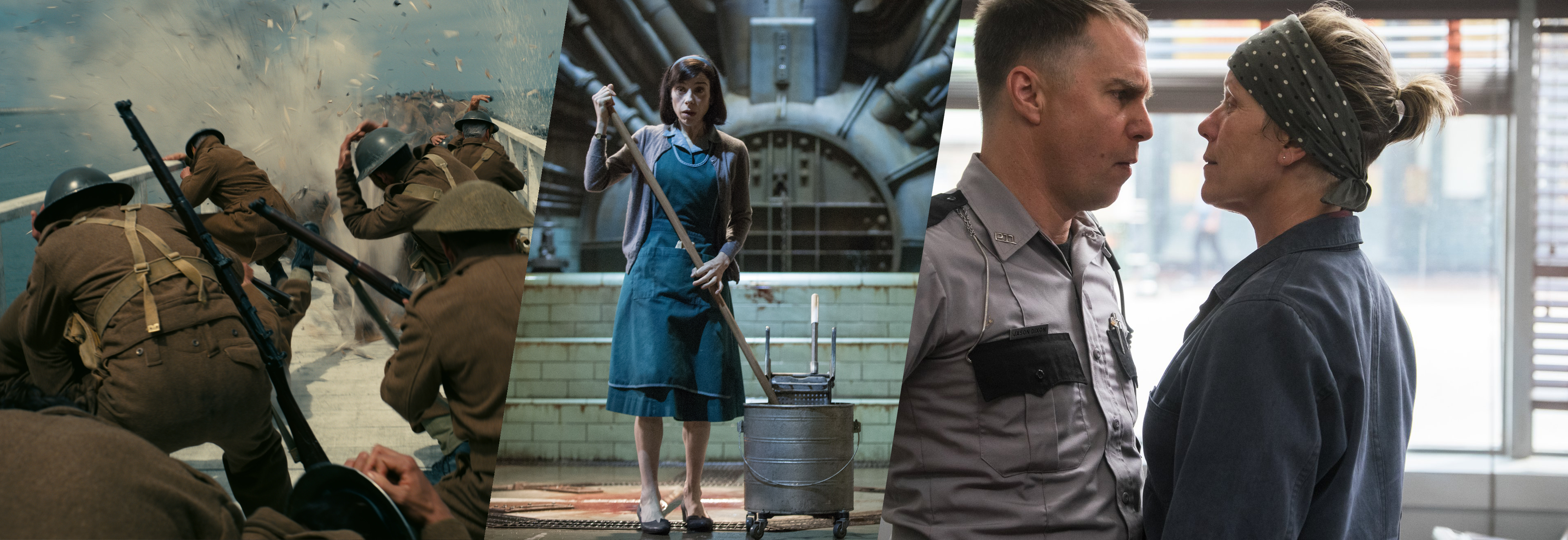Why this year's Best Picture race is a total crapshoot
Who will win the Oscars' biggest prize this year? No one has any idea.


A free daily email with the biggest news stories of the day – and the best features from TheWeek.com
You are now subscribed
Your newsletter sign-up was successful
In most years, by the time Oscar night rolls around, the categories have been so exhaustively analyzed by pundits and prognosticators that there are no real jaw-dropping surprises in store. But no one could've predicted what happened back on Feb. 26, 2017, when Warren Beatty and Faye Dunaway mistakenly announced that La La Land had won Best Picture — leaving that movie's producer Jordan Horowitz the unenviable task of saying that, no, there'd been a mistake and Moonlight had actually won.
The mix-up was memorable, but it wasn't the only reason why that moment was so shocking. Up until the big reveal, La La Land seemed to have built up unstoppable awards season momentum. Moreover, it had the feel of a Best Picture: slick, showy, deeply rooted in cinema history, with an emotional sweep and a stirring if bittersweet "follow your dreams" message. Moonlight, meanwhile, is a small masterpiece, made cheaply and artfully, and concerned with lives on the margins. It's the kind of film that makes critics' "Best of the Year" and even "Best of the Decade" lists, but that usually comes up just short when the Academy of Motion Picture Arts and Sciences hands out its award for Best Picture.
But maybe that's changing. This year, of the nine Best Picture nominees, there are four that would fit into what could be called the "traditional" Academy Awards mold. Darkest Hour and Dunkirk are stylish, large-scale movies about war and sacrifice; Phantom Thread is a handsome, well-acted period-piece; and The Post is a star-studded, politically relevant dramatization of an important moment in American media history. And yet none of these are considered favorites to win the Oscars' big prize.
The Week
Escape your echo chamber. Get the facts behind the news, plus analysis from multiple perspectives.

Sign up for The Week's Free Newsletters
From our morning news briefing to a weekly Good News Newsletter, get the best of The Week delivered directly to your inbox.
From our morning news briefing to a weekly Good News Newsletter, get the best of The Week delivered directly to your inbox.
Neither does there seem to be much hope for Call Me by Your Name, Get Out, or Lady Bird, each of which falls into the old "honor just to be nominated" slot. They're critics' darlings (and in the case of Get Out and Lady Bird, big box office hits) that may score in one of the less-prestigious Oscar categories. If any of these three won Best Picture, it'd be a Moonlight-level upset.
But here's what's strange about this awards season: Taking into account what is now nine full decades of Oscar history, in most races this year's two frontrunners would've likely been underdogs too.
The Shape of Water and Three Billboards Outside Ebbing, Missouri are the kinds of movies that get nominated for Best Picture, sure. They're well-written and well-performed, with recognizable stars aplenty, and they both touch on serious social issues — bigotry and abuse of authority, in both cases — without being entirely about their "message." They've connected with audiences as well, each making over $100 million at the box office worldwide, which is phenomenal for films of their scale.
There's not a whole lot of precedent for a movie like The Shape of Water winning Best Picture, though. It's essentially a whimsical fable, filtered through director Guillermo del Toro's love of old monster movies and Hollywood melodramas, and informed by his strong anti-fascist politics. Fantasy films have won big at the Oscars before, but never one as quirkily personal as this one.
A free daily email with the biggest news stories of the day – and the best features from TheWeek.com
So what about Three Billboards? Well, at the 1968 ceremony, the Academy honored In the Heat of the Night, another small-town crime story with racism as a major theme. Some have also compared Three Billboards to the 2006 winner Crash ... though most folks who've made that connection are doing so derogatorily.
That's another thing that makes this year so odd. La La Land had plenty of detractors, many of whom were fervent Moonlight supporters. But the movie also had passionate, vocal fans, who pushed back against the naysayers. Conversely, over the past few months Three Billboards has been knocked around by think-pieces calling writer-director Martin McDonagh's take on American racism shallow and unhelpful; but even as it keeps racking up awards, we haven't seen much backlash to the backlash.
As for The Shape of Water, it's a film that many critics feel warmly toward, while others have shrugged it off as "just not for me." But it hasn't inspired a lot of fiery arguments, pro or con. Mostly, the industry and movie buffs alike seem happy that someone as talented and hard-working as del Toro is getting recognized for what is so obviously a labor of love.
A true "upset" at this year's Oscars might not to be a sudden surge of votes for something small like Lady Bird or Get Out (both of which, it's worth noting, are widely beloved), but rather a last-minute momentum-shift to Dunkirk.
There's an argument to be made that this isn't just possible, but probable. There was a time when the best way to predict the Best Picture winner in a year with no clear favorite was to look for the one with the longest closing credits. Many of the hundreds of people who work on movie crews are Oscar voters, and have been known to support the likes of Braveheart, Gladiator, Titanic, and The Lord of the Rings: Return of the King because those kinds of productions pay the bills.
It helps too that Dunkirk comes from the fertile mind of Christopher Nolan, a smart and ambitious filmmaker who's made billions of dollars for Hollywood while shifting between heavily hyped blockbusters like The Dark Knight and funky originals like Inception and Interstellar. He's the kind of filmmaker the Academy should want to hail.
The stumbling-block is that Dunkirk is too difficult a film for many to love whole-heartedly, because of the complicated way it follows the aftermath of the 1940 Battle of France from three different intertwined perspectives, each moving at a different pace. Once again, Nolan has turned an arty idea into stacks and stacks of money, pulling in over $500 million worldwide. But the movie is still generally admired more than adored.
Some have suggested that the Academy is going through an evolution, which may change what we think of as a "Best Picture" in the near future. After the #OscarsSoWhite controversy a few years ago, the Academy shook up its membership, looking to bring in more racial, ethnic, and gender diversity, as well as more young people — while pushing out some of the older, stodgier voters. Pundits pointed to those changes as directly responsible for the Moonlight surprise last year.
But frankly, over the course of this decade, the Best Picture winners have been "non-traditional" as often as they've been "safe." For every conventional champion like The King's Speech (a tasteful historical drama), 12 Years a Slave (an artful and well-acted take on a grim chapter in America's past), and Spotlight (an energetic ensemble piece ripped from recent headlines), there's been a film like The Artist, Argo, and Birdman that's harder to pigeonhole.
Those three winners didn't exactly tower over the competition in their respective years. Even now, it's hard to argue that they've lasted as long in the public consciousness as Boyhood, Lincoln, American Sniper, Silver Linings Playbook, The Grand Budapest Hotel, Zero Dark Thirty, Django Unchained, Selma, The Help, Moneyball, Whiplash, or The Tree of Life ... all of which were losers in the years when The Artist, Argo, or Birdman won.
The real problem — if perfectly fine movies like The Shape of Water and Three Billboards Outside Ebbing, Missouri winning Best Picture constitutes a "problem" — is that we as a culture may have gotten into our own heads too much when it comes to the Oscars, and when it comes to what we think of as "deserving."
The history of the Best Picture category is filled with winners that are less well-regarded now than their competition, from The Greatest Show on Earth (which beat High Noon and The Quiet Man) to, yes, Crash (which beat Brokeback Mountain). And the conventional wisdom already holds that whatever wins Best Picture this Sunday night likely won't endure as long as Get Out, Phantom Thread, Call Me by Your Name, or Lady Bird ... or, for that matter, the un-nominated (in this category) Star Wars: The Last Jedi, Wonder Woman, and the surprise smash The Greatest Showman.
We've become conditioned to expect this, for some reason. Cinephiles like to subdivide the movies we actually think are the best of the year (which for me would include The Florida Project, Baby Driver, Their Finest, A Ghost Story, and mother!) from the ones we believe have an actual shot of winning Best Picture. And then we root accordingly, finding ourselves getting all worked up, positively and negatively, about movies that aren't even really our favorites (or our least-favorites) of the year.
Somehow, one of the "great, but not Best Picture material" films actually won in 2017. This year, that seems less likely. But who knows? The Academy has taken us on a pretty wild ride in the 2010s.
Even if everything goes according to plan on Sunday night, the big winner is bound to be a weird one.
Noel Murray is a freelance writer, living in Arkansas with his wife and two kids. He was one of the co-founders of the late, lamented movie/culture website The Dissolve, and his articles about film, TV, music, and comics currently appear regularly in The A.V. Club, Rolling Stone, Vulture, The Los Angeles Times, and The New York Times.
-
 Why are election experts taking Trump’s midterm threats seriously?
Why are election experts taking Trump’s midterm threats seriously?IN THE SPOTLIGHT As the president muses about polling place deployments and a centralized electoral system aimed at one-party control, lawmakers are taking this administration at its word
-
 ‘Restaurateurs have become millionaires’
‘Restaurateurs have become millionaires’Instant Opinion Opinion, comment and editorials of the day
-
 Earth is rapidly approaching a ‘hothouse’ trajectory of warming
Earth is rapidly approaching a ‘hothouse’ trajectory of warmingThe explainer It may become impossible to fix
-
 Walter Isaacson's 'Elon Musk' can 'scarcely contain its subject'
Walter Isaacson's 'Elon Musk' can 'scarcely contain its subject'The latest biography on the elusive tech mogul is causing a stir among critics
-
 Welcome to the new TheWeek.com!
Welcome to the new TheWeek.com!The Explainer Please allow us to reintroduce ourselves
-
 The Oscars finale was a heartless disaster
The Oscars finale was a heartless disasterThe Explainer A calculated attempt at emotional manipulation goes very wrong
-
 Most awkward awards show ever?
Most awkward awards show ever?The Explainer The best, worst, and most shocking moments from a chaotic Golden Globes
-
 The possible silver lining to the Warner Bros. deal
The possible silver lining to the Warner Bros. dealThe Explainer Could what's terrible for theaters be good for creators?
-
 Jeffrey Wright is the new 'narrator voice'
Jeffrey Wright is the new 'narrator voice'The Explainer Move over, Sam Elliott and Morgan Freeman
-
 This week's literary events are the biggest award shows of 2020
This week's literary events are the biggest award shows of 2020feature So long, Oscar. Hello, Booker.
-
 What She Dies Tomorrow can teach us about our unshakable obsession with mortality
What She Dies Tomorrow can teach us about our unshakable obsession with mortalityThe Explainer This film isn't about the pandemic. But it can help viewers confront their fears about death.
